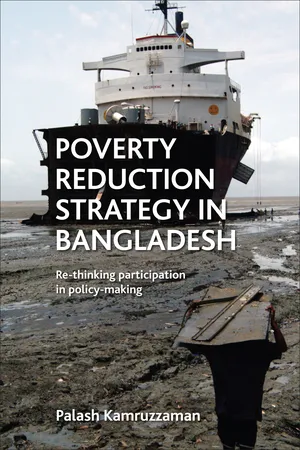
Poverty Reduction Strategy in Bangladesh
Rethinking participation in policy making
- 224 pages
- English
- PDF
- Available on iOS & Android
Poverty Reduction Strategy in Bangladesh
Rethinking participation in policy making
About this book
This book analyses government relationships with international financial institutions by evaluating the role of citizen participation when national poverty reduction policies are formulated in low-income countries. Based on in-depth research from Bangladesh, the concept of participation is investigated from the contrasting perspectives of theory and practice. The first part of the book explores the rhetoric of participation in development policies, while the second part presents empirical evidence of participation in the formulation of Bangladesh's Poverty Reduction Strategy Paper where, at local level, development brokers play an important role. It argues that participatory policies are not enough, that an overhaul is needed in the approach to poverty reduction which will require strong political commitment. This topical book will make essential reading for academics, students and researchers in international development studies and poverty-related fields.
Frequently asked questions
- Essential is ideal for learners and professionals who enjoy exploring a wide range of subjects. Access the Essential Library with 800,000+ trusted titles and best-sellers across business, personal growth, and the humanities. Includes unlimited reading time and Standard Read Aloud voice.
- Complete: Perfect for advanced learners and researchers needing full, unrestricted access. Unlock 1.4M+ books across hundreds of subjects, including academic and specialized titles. The Complete Plan also includes advanced features like Premium Read Aloud and Research Assistant.
Please note we cannot support devices running on iOS 13 and Android 7 or earlier. Learn more about using the app.
Information
Table of contents
- POVERTY REDUCTION STRATEGY IN BANGLADESH
- Contents
- Acknowledgements
- List of tables and figures
- Acknowledgements
- Introduction
- Part One. Participation in theory
- 1. Participation: an iron hand in a velvet glove
- Poverty reduction: discourse or a commitment to change?
- 2. Poverty Reduction Strategy Papers: another brick in the wall
- Part Two. Participation in practice
- 4. Participation: the evidence
- 5. Is a comprador class being created?
- 6. Think local, act local
- 7. Conclusion
- References
- Index